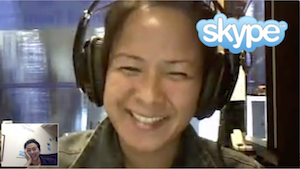The one skill you should look for when interviewing freelancers
 “So what is the secret for hiring good freelancers?”
“So what is the secret for hiring good freelancers?”Communication is a circle, not a one-way street. You hear people say in life, “But I told him!” as if telling at somebody were sufficient. If he hasn’t received what you’ve told him, there is no communication.
It takes two to communicate: the sender and the receiver. The receiver has to acknowledge the message by sending a reply back to the sender, thus completing the circle before a communication has taken place.
- Do I feel that I’m being 100% understood?
- Is the freelancer signaling through facial expression or verbal clarification the she is fully understanding what I am saying?
- Does she seem to care of what I am saying?
This imposes a constant obligation on the part of the sender to (1) make sure his message is clear and (2) check that the receiver has received it. And an obligation on the part of the receiver to (1) make sure he’s heard the message and is able to duplicate it and (2) let the sender know he’s received the message. Without the process of duplication there is no communication.

